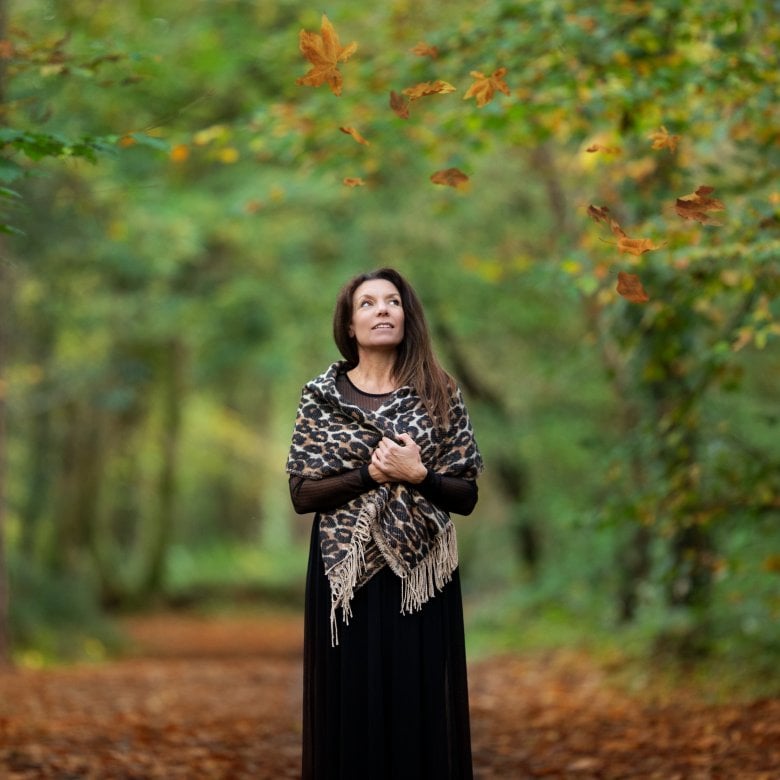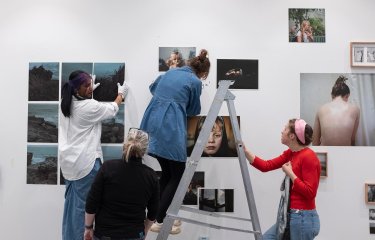Writer and theatre practitioner Nicola Coplin on the power of creative writing
15 May 2024

Nicola Coplin has written, performed and campaigned on environmental issues for over twenty years. She has been inspiring Falmouth’s creative writing students since 2013, and recently took up the role of Deputy Course Leader for Falmouth’s online BA in Creative Writing. We chatted to her about her beginnings in environmental science and route into creative writing, her ambitious PhD project and her unwavering commitment to the writing craft.
How did you get into creative writing and why are you passionate about it?
I think I’ve had a very non-linear route into creative writing, which is interesting to me because ‘non-linearity’ feeds into my PhD research. My first degree was in Environmental Science, and alongside becoming involved in some campaigns with Greenpeace I developed a particular interest in how we communicate environmental issues. My first big job was in an editorial department at Reuters, reading articles from all over the world on politics, business, the environment and the arts. But the real catalyst for my interest in creative writing came in the form of a piece of environmental theatre I was involved in, and I was just captivated by it.
I went on to do some acting training at the Hub Theatre School and studied for an MA in Creative Writing. My sense is that all forms of writing, but particularly writing for the stage, can be a really engaging, dramatic and fun way to communicate political ideologies. I guess where I sit now is somewhere between the exploration of the individual writing voice and how we communicate our ideas, and then our relationship with our wider society and how we might create a discourse in our communities about the things that matter to us.
Writing has the ability to communicate from soul to soul, and our own experience of life can be greatly enriched by reading it
What piece of creative writing has had the biggest impact on you, and why?
The pieces of creative writing that have had the biggest impact on me are those books that I read as a teenager – The Unbearable Lightness of Being and Anna Karenina being two examples. They are very long and philosophical novels, but they have heart-driven stories at their core and have deep political and philosophical discussions. I think this is something that I feel has become really important to me: the challenge of expressing complicated ideas in engaging and entertaining ways – whether through exciting plots or beautiful language – and those are the things we continue to play with as creative writers.
How does your background in acting influence your writing?
I find that writing is very much like improvising as an actor; you can hear the voices in your head and there are sections of the script that almost write themselves because you've created these characters. I think my acting experience also probably encourages me to be more playful with my writing. There are so many ways to break with convention in the theatre, and I find that a source of inspiration. It’s something I’m exploring in my PhD; breaking the form and writing a story that doesn't simply have a beginning, a middle and an end, can be a powerful tool, particularly if you are wanting to make a political or ideological statement.
Could you tell us about your PhD practice, using writing to reframe experiences of surviving domestic abuse?
My PhD is looking at the structure of writing screenplays and whether writing non-linear script has something to say on behalf of women surviving and healing from domestic abuse. Actually, it follows on from my previous point as I am taking inspiration from theatrical conventions and screenwriting theory. I am playing with firstly the practice of writing a screenplay itself, looking at the form, and what happens when we subvert it. I’m excited to explore the results. Can it make a political statement about the way that we tell stories? Are the ways in which we tell stories good enough to encapsulate a wide variety of feelings or experiences? It’s a very playful and expansive project.
As Deputy Course leader for Falmouth’s online degree in Creative Writing, what do you most enjoy about the role, and of being part of a global community of writers?
One of the key elements of the role is responding to students’ ideas, and I see that as a real privilege. I really enjoy hearing students talk about their own ideas and helping them to develop their work. Above all, I guess the job is all about encouraging them to express themselves. There's a theory behind writing that when we write with authenticity, it becomes more believable, and so, when people write from their own experience, their writing will be more engaging and compelling. I've taught hundreds of students during my career, and they've all had something different to say.
Breaking the form and writing a story that doesn't simply have a beginning, a middle and an end, can be a powerful tool, particularly if you are wanting to make a political or ideological statement
The fact that the online degree brings together students from all over the world really adds to this depth of experience and the breadth of ideas, and something that really excites me is seeing them develop their own voices. I also think that being part of a community really helps to develop your writing, and one of the key things that we encourage throughout the degree and beyond is for the students to share their work and get feedback on it. It's something that some students need time to develop the confidence to do, but having a community of fellow writers that you trust and who you know will give good feedback is so, so valuable.
Why do you think people should choose to study creative writing?
Writing is present everywhere. Whether we're writing emails and social posts, or longer form content such as screenplays or novels, basically all organisations need people that are competent with words.
This is even more important considering the rise of AI. While there might be something useful that comes out of it, the work produced by AI at the moment seems to really lack authenticity. It can reproduce the formula of writing, but I don’t believe it can currently offer anything truly original. Perhaps it is that soul that is missing? Let’s hope so!
One of the modules I lead on the BA course is called ‘Bound by None: Place and Adventure’ which challenges students to develop their travel, place and nature writing skills, alongside critical approaches to exploration and environmentalism, and it’s a beautiful module because it explores our human connections to place. Whether it's a simple description of a place in a guidebook, or a longer form piece, it must be interpreted through the eyes of the individual as their lived experience. We've had some wonderful work produced on the module because we have this rich community of students living in such different places around the world. I don't think that AI could recreate that type of work.
But also, beyond that - and I can see this is becoming a theme here! - creative writing is a vital tool for self-expression, and it allows us to communicate deep and emotional ideas. It can help us to process what we're thinking and feeling and is also a way to communicate difference to other people, and to improve relationships. For example, I think Khaled Hosseini’s novel The Kite Runner was transformative in how it showed a Western audience what it was like to grow up in Afghanistan. Similarly, someone like Maya Angelou has told stories of her upbringing and her community that may have been lost were it not for her beautiful writing. I Know Why The Caged Bird Sings is still one of my favourite books and gave me such an incredibly deep and painful insight into racism in America. Writing has the ability to communicate from soul to soul, and our own experience of life can be greatly enriched by reading it.




